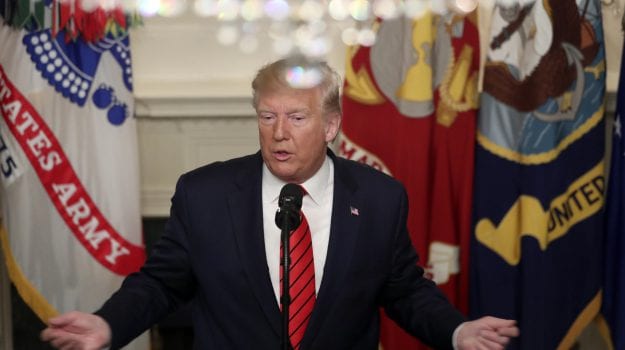Eliminating the Islamic State group’s elusive leader gives President Donald Trump a new argument for leaving Syria, but the U.S. military campaign against the extremists is far from finished.
The killing of Abu Bakr al-Baghdadi by U.S. forces leaves the Islamic State without an obvious leader, a major setback for an organization that in March was forced by American troops and Kurdish forces out of the last portion of its self-declared “caliphate,” which once spanned a swath of Iraq and Syria.
But what does this mean for ISIS and what else should you know about his death?
What happens now with ISIS?
The Islamic State, which arose from the remnants of al-Qaida in Iraq after that group’s defeat by U.S.-led forces in 2008, has ambitions to regenerate again. And it remains a dangerous threat in Iraq, Afghanistan and beyond.
“The bottom line is: This puts the enemy on its heels, but the ideology — and this sounds so cliched — it is not dead,” said Chris Costa, a former senior director for counterterrorism for the National Security Council in the Trump administration.
More: Donald Trump withheld details of ISIS raid from Democrats
Key to the Islamic States is its “kill where you are” ethos, encouraging a far-flung network of followers, including those in the United States, to commit violence however and wherever they can. That jihadist message is likely to live on, even with the death of al-Baghdadi.
That means U.S. forces, perhaps in reduced numbers, will continue hunting and attacking key Islamic State targets, even as Trump says he’s committed to a 2016 campaign pledge to bring them home and end “endless wars” started under his predecessors.
Syrian Kurdish forces say they killed close al-Baghdadi aide
Mazloum Abdi, the commander of the Kurdish-led Syrian Democratic Forces, said his group’s intelligence cooperated with the U.S. military to target on Sunday al-Baghdadi’s aide, Abu Hassan al-Muhajir, in a village near Jarablus, a town in northwestern Syria. It was part of ongoing operations to hunt down IS leaders, Abdi said.
More: Photo of Trump watching al-Baghdadi raid compared to Obama watching bin Laden operation
If confirmed, the death would be another blow to ISIS. U.S. officials had no immediate comment on the Syrian Kurdish claim or on the fate of al-Muhajir.
The Britain-based Syrian Observatory for Human Rights also reported al-Muhajir’s death, saying he was traveling in a convoy made up of an oil tanker and a sedan. The bodies of those killed in the attack were charred and it wasn’t immediately clear how the al-Muhajir’s identity could have been confirmed.
Family of Americans killed by ISIS react to al-Baghdadi’s death
U.S. Sen. Jeanne Shaheen said al-Baghdadi has the blood of Americans on his hands, including journalist James Foley of New Hampshire, and has finally been brought to justice. Foley was killed by ISIS fighters in 2014 after being kidnapped in Syria.
Foley’s parents, Diane and John Foley, told WMUR-TV that al-Baghdadi’s death is significant, but it doesn’t end the threat. Diane Foley said “we’ve got to be ready for retaliation.”
In Arizona, Kayla Mueller’s parents had mixed emotions about the news of al-Baghdadi’s death. Their daughter was captured and raped while being held as an ISIS hostage. She was ultimately killed after being held for 18 months.
Kayla Mueller grew up in Prescott and went to Northern Arizona University before traveling the world as an aid worker. While working in Turkey, she crossed into northern Syria with a companion to visit a hospital. Though family members confirmed her death, Kayla’s body was never discovered.
“I still want to know, ‘Where is Kayla?’ and what truly happened to her and what aren’t we being told,” Marsha Mueller said. “Someone knows, and I’m praying with all my heart that someone in this world will bring us those answers.”
Fonte: AP



